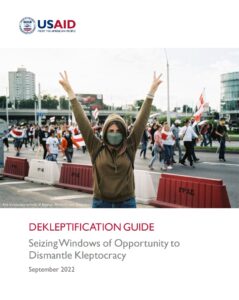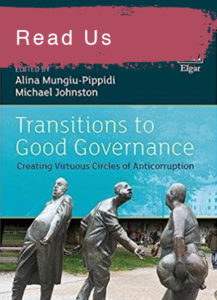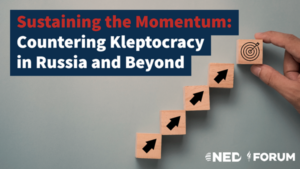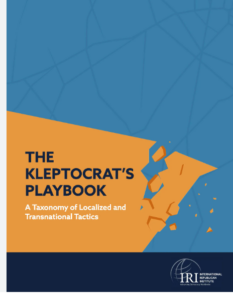 The president of the European Parliament has warned that “European democracy is under attack”, following allegations that Qatar bribed EU officials to win influence, the BBC reports:
The president of the European Parliament has warned that “European democracy is under attack”, following allegations that Qatar bribed EU officials to win influence, the BBC reports:
Roberta Metsola said that “open, free, democratic societies are under attack”. Belgian police have arrested four people, among them European Parliament Vice-President Eva Kaili. The four have been charged with corruption and money-laundering. Qatar has denied wrongdoing.
It’s a widely held view across the EU that although the Russian war in Ukraine has catalyzed reform of illicit finance and sanctions legislation in many EU member states, countries should not see these efforts merely as a response to the war; nor should they be confined to a box-ticking exercise seeking compliance with Financial Action Task Force (FATF) standards, says a new report from the Royal United Services Institute (RUSI).
Efforts must be focused on achieving robust anti-money laundering and sanctions-implementation regimes with the clear objective of combating illicit finance and sanctions evasion, not merely meeting compliance requirements, and, in doing so, reinforcing the rule of law and the security of democracy, adds the report, the result of a forum convened by RUSI’s Centre for Financial Crime and Security Studies in partnership with the Hertie School’s Jacques Delors Centre at the Hertie School, with support from the National Endowment for Democracy (NED). RTWT
 High transparency alone is not sufficient to achieve control of corruption, especially in countries with low human development and poor rule of law, a leading expert observes. Despite the salience of transparency in policy and democracy debates a global measurement of transparency has always been missing, notes Alina Mungiu-Pippidi of the Berlin-based Hertie School. In its absence, measuring the impact of transparency on accountability and corruption for a large number of countries has been difficult, she writes in a new paper, introducing a new measurement of real transparency—the T-index.
High transparency alone is not sufficient to achieve control of corruption, especially in countries with low human development and poor rule of law, a leading expert observes. Despite the salience of transparency in policy and democracy debates a global measurement of transparency has always been missing, notes Alina Mungiu-Pippidi of the Berlin-based Hertie School. In its absence, measuring the impact of transparency on accountability and corruption for a large number of countries has been difficult, she writes in a new paper, introducing a new measurement of real transparency—the T-index.
Mungiu-Pippidi argues that de facto transparency must be considered alongside de jure (legal) transparency if we are to judge the impact (or lack of) transparency against accountability and corruption, as a large implementation gap exists, in particular in poor countries, between legal commitments and real transparency. The T-index has a significant impact on both perception and objective indicators of corruption, including perceived change in corruption over time as measured by the Global Corruption Barometer.
 The T-Index was supported by the grants from the National Endowment for Democracy (NED), the International Centre for Private Enterprise (CIPE), by the ANR and the French government. RTWT
The T-Index was supported by the grants from the National Endowment for Democracy (NED), the International Centre for Private Enterprise (CIPE), by the ANR and the French government. RTWT
Putin’s People by Catherine Belton, Putin’s Kleptocracy: Who Owns Russia? by Karen Dawisha, provide deep background on the formation of Russia’s oligarchic-kleptocracy, and Putin’s path to the head of a clique of former KGB operatives who effectively took over the country, notes Curtis Milhaupt, William F. Baxter-Visa International Professor of Law at Stanford University. Tragic, fascinating and informative, these books take readers on a journey into Putin’s mindset and the making of Russia’s highly warped political economy. Published well before Russia’s invasion of Ukraine, these books presciently discuss elements of the Putin regime, such as the weaponization of gas and oil.
 Corruption, or the “abuse of entrusted power for private gain,” is one of the greatest challenges to democracy, the International Republican Institute observed on December 9 – International Anti-Corruption Day. Global corruption is estimated to cost trillions of dollars a year in bribes, fraud, and lost tax revenues.
Corruption, or the “abuse of entrusted power for private gain,” is one of the greatest challenges to democracy, the International Republican Institute observed on December 9 – International Anti-Corruption Day. Global corruption is estimated to cost trillions of dollars a year in bribes, fraud, and lost tax revenues.
Kleptocracy is a lesser-known form of transnational corruption wherein political, business, or criminal elites use their power to plunder wealth and resources from their home country for their own economic or political gain, posing an existential threat to democracy. IRI’s Kleptocrat’s Playbook notes that kleptocrats use a wide array of tactics to not only accumulate wealth, but also to solidify their hold on power and prevent challenges to their rule.
USAID is building on the recent release of state-of-the-art guidance aimed at modernizing anti-corruption approaches, including a Dekleptification Guide (above) focused on uprooting entrenched corruption during “windows of opportunity,” a Guide to Countering Corruption Across Sectors, a specialized handbook on countering corruption in the global health sector, and a report on the State of Innovation in addressing transnational corruption.







